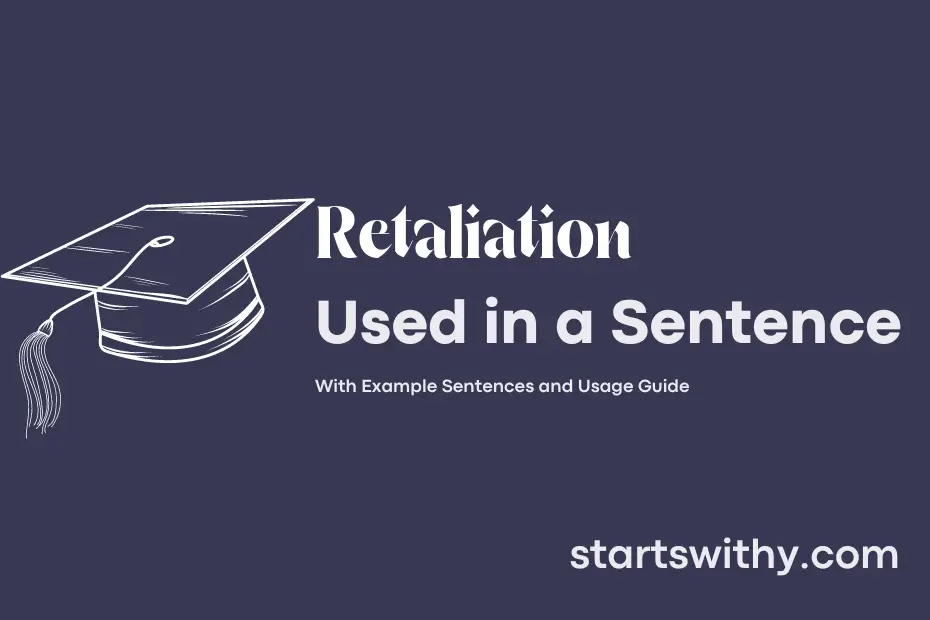Retaliation is the act of responding or reacting to a perceived provocation or harm with a similar action. This form of retaliation is often seen as a means of seeking retribution or seeking justice for a wrongdoing.
In various contexts, retaliation can manifest in different forms – from personal conflicts to workplace disputes. Understanding the implications and consequences of retaliation is crucial in navigating conflicts and finding peaceful resolutions.
7 Examples Of Retaliation Used In a Sentence For Kids
- Retaliation means reacting to someone who has hurt your feelings.
- I will not hit my friend in retaliation if he takes my toy.
- It is important to talk to a teacher if you feel like retaliation is happening.
- Let’s solve our problems with words instead of using retaliation.
- Remember, no one likes to be on the receiving end of retaliation.
- We should always try to be kind and avoid retaliation.
- If you see someone being bullied, tell a grown-up so they can stop the retaliation.
14 Sentences with Retaliation Examples
- Retaliation from the professor could mean a lower grade on your assignment if you don’t follow the guidelines.
- It’s important to address any issues with your roommate directly to prevent any retaliation.
- Avoiding retaliation is key in maintaining healthy relationships with your classmates.
- Retaliation in group projects can hinder the success of the team.
- Seeking help from campus resources can protect you from potential retaliation.
- Engaging in retaliation can damage your reputation and affect your academic career.
- Standing up against retaliation can help create a more positive and inclusive campus environment.
- Using proper channels to address conflicts can prevent retaliation from occurring.
- When faced with retaliation, it’s important to document any incidents for reference.
- Understanding the consequences of retaliation can help students make better decisions in challenging situations.
- Reporting instances of retaliation to campus authorities is crucial for maintaining a safe learning environment.
- Joining student organizations can provide support in dealing with retaliation.
- Seeking advice from mentors or counselors can help navigate situations involving retaliation.
- Participating in conflict resolution workshops can equip students with skills to handle retaliation effectively.
How To Use Retaliation in Sentences?
When Retaliation is used in a sentence, it typically implies a response or action taken in return for someone else’s actions. Here is a guide on how to use Retaliation effectively:
-
Identify the situation: Before using Retaliation in a sentence, understand the context in which you want to use the word. Determine if you are referring to a response to an attack, insult, or negative behavior.
-
Choose the appropriate tense: Retaliation can be used in various tenses depending on when the response occurred or will occur. For example, “She will retaliate” (future tense) or “He retaliated quickly” (past tense).
-
Formulate a sentence: Construct a sentence that clearly conveys the act of responding to a provocation. For instance, “The country’s retaliation against the cyber attack was swift and decisive.”
-
Review the sentence: Double-check your sentence to ensure that Retaliation is used correctly and fits the context. Make sure the sentence is clear and conveys the intended meaning.
-
Practice using Retaliation in different sentences: To improve your understanding and use of the word, practice incorporating Retaliation into various sentences. This will help you become more comfortable using the word in different contexts.
Remember, Retaliation is a powerful word that signifies a response to certain actions, so use it judiciously and accurately in your sentences.
Conclusion
In conclusion, retaliation can take various forms and is often seen in response to perceived offenses or injustices. Our examples have shown how retaliation can manifest in both personal conflicts and larger societal issues. It can range from small-scale actions like spreading rumors to more serious consequences such as physical harm or legal repercussions. Retaliation is a common human behavior that can have negative impacts on individuals and communities, perpetuating cycles of violence and conflict.
It is important to address and prevent retaliation in order to promote peace and cooperation. By understanding the motivations behind retaliatory behavior and implementing strategies for conflict resolution, we can work towards creating a safer and more harmonious environment for everyone. Letting go of the urge to retaliate and choosing forgiveness and reconciliation instead can lead to more positive outcomes and foster healthier relationships among individuals and within society as a whole.



